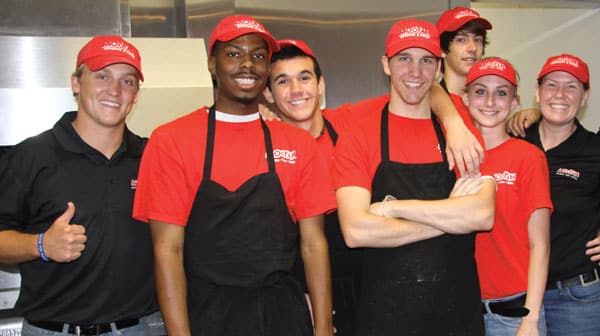What’s hot in foodservice?
Ask the entrepreneurs of the Millennial generation. Their ideas reflect Gen Y values such as sustainability, nutrition, and charitable giving.
Their dedication is unwavering. Mary Lemmer skipped her high school prom to go to the Northeast and research Italian water ice. Seth Priebatsch debuted his first online company—he admits it was a complete failure—at 12, and kept conceiving ideas until one stuck. Deepti Sharma kissed law school goodbye when an all-night study session inspired an ordering website for food trucks.
They frequently play dress-up. As Bradley Newberger says, “Somebody once told me, if you ever want to be an entrepreneur, you have to be able to wear a lot of hats, and I think I have a closet full of about a thousand hats.”
Age is no barrier. Investors love the high energy of young entrepreneurs. And when people don’t take them seriously, as 25-year-old Sharma says, “you take that as a way to put it back in their face and say, ‘Just because I don’t have 20 years of experience in the field doesn’t mean I can’t make it.’”
| Our Choices for Top Young Entrepreneurs in the Restaurant Industry | |
|
Founder and CEO / foodtoeat.com Franchisee / Mooyah Christos Marafatsos & Kosta Dionisopoulos Founders and Owners / Delta Produce Founders / Nom Nom Food Truck Owner / Iorio’s Gelateria |
Digital Marketing Specialist / Tavistock Restaurants President & Cofounder / Ambiance Radio Founders / Two Trucks LLC Chief Ninja / Levelup Jonathan Neman, Nicolas Jammet & Nathaniel Ru Founders / Sweetgreen |
| Plus: Five Who Just Missed the Age Cut | |

Founder and CEO / foodtoeat.com
Age: 25
FoodtoEat overhauls online ordering. The website features 350 restaurants in New York and 40 food trucks—the first service of its kind to align with street vendors. Patrons can jump the line when they arrive to pick up orders, and, unlike competitors like Grubhub and Seamless, which charge restaurants up to 15 percent of the total order, FoodtoEat charges a flat 10 cents.
“Restaurants are a very high-risk business,” Sharma says. “If a restaurant doesn’t survive within its first year, they usually just shut down. And we’ve had that happen with two or three of our restaurants. Our pricing model is helping them to be able to sustain their business.”
In the summer of 2008, FoodtoEat was a far-flung possibility. Sharma had just graduated from Stony Brook University in New York and was preparing to take a job at a consulting firm in Washington, D.C., while studying for the LSAT. But papers she’d written on restaurant operations swirled in her head, and, living in Long Island, she was inundated with food trucks everywhere she walked.
“I kept thinking, what can I do, what kind of combination of a business can I run?” she says.
In late 2010, she hired a firm in Delhi, India, to design FoodtoEat. While technicians worked out the digital design, Sharma set out to get food trucks on board.
“It was a battle,” she says. “They were like, ‘No, I don’t want to work with you because I don’t trust you. Are you going to take my money from me?’ But slowly we were able to prove ourselves to them.”
FoodtoEat beta-launched in June 2011, and Sharma is now eyeing expansion into Philadelphia, Washington, D.C., and the West Coast.
As for her abandoned law degree? “I should probably do something part-time,” she says. “Maybe a JD/MBA.”

Franchisee / Mooyah
Age: 27
Tired of the corporate world of sports marketing, McGuire left to pursue his lifelong dream of starting his own business in June 2011.
McGuire and business partner, Frank Sciuto, opened their Mooyah franchise in the small town of Burleson, Texas, to avoid the over-saturated “better burger market” of Fort Worth.
Originally, McGuire had no plan of opening a franchise.
“I didn’t even have any intention of entering the foodservice industry,” McGuire says. “However, now I can’t imagine what it would have been like during those first months to not be able to pick up the phone and call [Mooyah corporate] after a rough day.”
McGuire has succeeded by being persistent.He apprenticed at a local Mooyah store for free to learn the ins and outs of the company. He then was unrelenting when getting funding for his franchise.
“We had to meet with nine banks before we could convince one to work with us,” he says.
With the business up and running, he is still bound by the strict guidelines of a start-up. Using diligent social media and word-of-mouth marketing, he saves money on advertising while working toward his lofty goal of $19,500 in transactions per week.
[pagebreak]
Christos Marafatsos & Kosta Dionisopoulos
Founders and Owners / Delta Produce
Ages: 25
Delta Produce began in the room next to cofounder Dionisopoulos’ bedroom. He and Marafatsos operated their produce company from his house for eight months before moving into a warehouse in Washington, D.C.
“We were looking for a profit that people rely on, something that fuels our economy,” Dionisopoulos says. “People eat every day, three times a day. So we wanted to get into the business of distribution.”
Delta Produce’s market advantage is that it is sustainable and fresh, and comes with free marketing. The partners create a strong social media presence for all their clients, advertising their deals and restaurant openings on Twitter and Facebook.
Local businesses in the Washington, D.C., area have caught on to Delta Produce’s mission. Clients include Burger King, the White House, the Department of State, and the Department of Justice.

Founders / Nom Nom Food Truck
Age: 25 & 27
Chen and Green are ahead of the curve in the food truck contest. At 25 and 27 years old, these recent UCLA graduates have already competed on the Food Network’s The Next Great Food Truck Race (they came in second) and have customers lining up for blocks to try their Vietnamese Banh Mi sandwiches.
The women started Nom Nom truck when they realized Los Angeles was lacking in Vietnamese cuisine. “We wanted to bring authentic Banh Mi sandwiches to a larger demographic,” Green says.
To save money, they originally rented their truck to save on overhead costs. Additionally, none of their revenue goes into costly marketing measures.
“All of our marketing is very organic. It either comes from social media or word of mouth,” Chen says. These social media efforts have served them well. Their Twitter handle, @NomNomTruck, has accrued more than 24,000 followers since 2009.
The company has even brought out their maternal instincts. “We consider our trucks our babies,” Chen says. “Right now we have three babies and we’re watching them grow.”
Owner / Iorio’s Gelateria
Age: 23
A Michigan native, Lemmer grew up visiting her grandparents on the East Coast. They emigrated from Italy and brought with them a delicious recipe for Italian water ice.
Lemmer says she would go home and ask for water ice in Michigan, only to be told by her parents that it was not available there. “They’d say, ‘Well, if you want it here, you’re going to have to bring it here,’” she says.
That was the genesis of Iorio’s [ee-or-ee-ohs]. Lemmer skipped her junior prom to travel northeast and research Italian water ice and frozen carts. She came back and started a catering service at 15, serving water ice at private parties, music festivals, and art fairs.
Demand grew to the point that Lemmer decided to open a store in Lansing, Michigan. There was just one problem: “Italian water ice is a very summery, hot weather kind of treat,” she says.
To make the business sustainable all year long, Lemmer added gelato to the concept, and Iorio’s Gelateria was born. A second store opened in Ann Arbor last year, attracting the adventurous culinary college crowd at the University of Michigan.
As a young leader, Lemmer hopes to empower people. “My goal is to help everyone do their jobs better, so that I’m not the necessary ingredient to make it work,” she says.
Digital Marketing Specialist / Tavistock Restaurants
Age: 22
Chen calls social media instinctive for Generation Y.
“You already know what it means to go update your status, to retweet someone, or to tag a photo, but the real challenge is knowing how to tie that to your business objective,” she says.
It’s a challenge Chen is up for. Her job at Tavistock Restaurants, whose portfolio includes Freebirds World Burrito, is to brainstorm social media strategy and handle customer relationships.
One example is Freebirds’ Fanatics loyalty program. “Our restaurants, they’re really loud, there’s rock ‘n’ roll music blaring, it can be really intimidating to some people,” Chen says. “So we want to get people in there three times so they really understand the brand and grow to love it from there.”
She created a system that rewards loyalty card registrants with food, enticing them with free drinks, chips, and burritos so they would visit. Her plan worked. Fanatics registrants increased five-fold during the first days of the revamped program.
Chen says social media is especially important and useful for new and growing chains. “If you start that early on, you set that standard for the guest to communicate with you in this way, and they’ll see that you’re an open brand that cares about them and their opinion,” she says.
[pagebreak]
President & Cofounder / Ambiance Radio
Age: 25
Research has proven for decades that music affects the way people feel and behave, but no one had yet applied much of this science to background music—until Newberger.
During his senior year at Cornell University, Newberger was student manager of the fine-dining restaurants on campus. After receiving multiple comment cards decrying the music, Newberger decided to find a source that would better suit the restaurants’ musical needs.
“It was while looking at the different options that were available that I realized people were missing something,” he says. “They weren’t using one thing to be able to come up with music. They were using channelized solutions, they were using sound music branding, trying to market music to what your brand sounds like. But it turns out, they weren’t using anything about science.”
Ambiance Radio uses science to create a fully customized musical approach to a hospitality or foodservice location. No two stores are given the same music, even within the same brand, and the result is quite effective, Newberger says.
“We recognize that music can really make people feel and react in certain ways,” he says. “For instance, we focus the music on helping the restaurant manage wait times, making it feel a little bit less like they’re waiting for a little bit more. We also affect the staff. When employees are happier, that will translate to happier guests in the long term.”
Ambiance Radio’s clients include Schlotzsky’s Deli, Firebirds, Pie Five Pizza Co., and Pizza Inn.
Newberger says playing the right music is the cheapest remodel a restaurant can do. “We’ve had a lot of success helping brands re-image, where changing the music was the first step in their long-haul remodel process and they saw an instant difference as soon as our music went in,” he says.
Founders / Two Trucks LLC
Ages: 26 & 25
With independent food trucks all the rage, it was only a matter of time until someone dreamed up a chain.
Pool and Wagner are working to develop the first national food truck company, Two Trucks LLC. These business partners plan to roll out 200 food trucks on the road by 2014.
Wagner, whose family founded and manages Johnsonville Sausage, approached Pool, who worked in restaurant consulting, with the idea to launch a food truck centered on sausages. This led to a truck they called The Butcher’s Son.
They started with two trucks in Dallas, a simple concept that later gave them their company name.
With Two Trucks, they have worked to develop a base in Dallas, “the next big city for food trucks,” as they call it. Their plan is to develop four other food truck brands in Dallas, and then expand into other cities, launching multiple food trucks at a time nationwide.
Pool and Wagner say they are well on path to achieving their goal, with three trucks on the road already and two more in development.

Chief Ninja / Levelup
Age: 23
Priebatsch is the mastermind behind LevelUp, a high-tech loyalty program meets mobile payment application.
This Princeton dropout’s business card boasts the title “Chief Ninja” instead of “CEO” or “Founder.” Whatever his formal title, Priebatsch and his company are on the path to revolutionize the way customers pay for quick-service food.
In order to pay using LevelUp, customers scan their personal QR code on the LevelUp app. This code is pre-linked to a debit or credit card of their choosing so they never have to pull out any plastic.
LevelUp tracks users’ purchasing patterns digitally and rewards return visits. Its success speaks for itself. Within 30 days, 65 percent of LevelUp customers return to pay full price at a participating quick-service merchant, and the average user returns 2.7 times to a participating merchant.
Priebatsch says his age has never been an issue for him, especially working through a digital platform. “When your product is awesome, age doesn’t really matter,” he says. “If you can honestly tell businesses you’re going to increase customer loyalty, raise sales, and save them payment processing costs, the last thing on their mind is your age.”
These 30-year-old executives, founders, and franchisees just missed our age mark. Their accomplishments, however, are no small feat.
Noah Glass / CEO OLO Online Ordering:
Glass founded OLO in 2005 to help restaurants improve their online ordering and advance their operational efficiency. Clients include Cold Stone Creamery, Five Guys Burgers & Fries, and Sonic.
Adam Eskin / CEO Dig Inn Seasonal Market:
Focusing on fresh supplies, local ingredients, and healthy preparation techniques, Eskin’s Dig Inn quick-serve concept has found traction with New York City eaters.
Matthew Corrin / Founder Freshii:
Corrin opened the first Freshii, a fresh fast food bar concept, in Canada in 2005, and has since expanded to the U.S., Austria, and Dubai.
Travis Heriaud / Franchisee McDonald’s:
Heriaud runs four McDonald’s in Phoenix. Additionally, he works with McDonald’s USA, serving on the Operators’ National Advertising Fund, which is responsible for making decisions regarding McDonald’s national advertising.
Clara Shih / board member Starbucks:
Shih sits on the Starbucks board of directors. She was the first to develop a social business application, Faceconnector, which kick-started the social customer-relations movement.
LevelUp already has more than 1,200 merchants and 100,000 users across Boston, New York, Philadelphia, Atlanta, Chicago, San Diego, San Francisco, and Seattle, with more signing up. Priebatsch’s clients include a variety of quick serves, such as CiCi’s Pizza, Ben & Jerry’s, and Quiznos.
As the company expands into new markets, the amount of monetary transactions doubles every two to three weeks. Despite having launched in June 2011, LevelUp is already processing about $1 million in transactions per month.
Jonathan Neman, Nicolas Jammet & Nathaniel Ru
Founders / Sweetgreen
Ages: 26, 26, 27
Take-out menus filled with plant seeds, a dining table made of reclaimed bowling alley wood, and an app to calculate your carbon footprint are all features of Sweetgreen.
Founded by Neman, Jammet, and Ru, this salad and yogurt quick-service chain makes it a priority to produce good food for both customers and the environment.
The three entrepreneurs have worked together to launch Sweetgreen since their senior year at Georgetown University.
The high energy of the three business majors allowed them to open the doors of their first restaurant within three months of graduating. In order to work efficiently, they divide up tasks. Neman focuses on finance, working mainly with investors. Jammet handles the logistics of operations, including menu planning. Ru is behind the scenes controlling marketing efforts, such as the company’s promotional rock concert, SweetLife.
“We have worked to create a lifestyle brand,” Neman says. “We want to show people you can have fun while living a sustainable lifestyle.”











